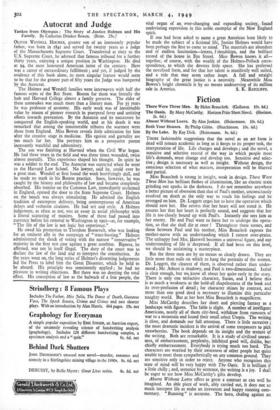Autocrat and Judge
OLIVER WENDELL HOLMES, greater son of an immensely popular father, was born in 1841 and served for twenty years as a judge of the Massachusetts Supreme Court. Transferred at sixty to the U.S. Supreme Court, he adorned that famous tribunal for a further thirty years, enjoying a unique position in Washington. He died at 94, the most honoured American jurist of the century. Here was a career of extraordinary fulfilment ; and yet, if judged by the evidence of this book alone, its most singular feature would seem to be that for the greater part of fifty years the Judge was hampered by the Autocrat.
The Holmes and Wendell families were interwpven with half the famous septs of the Bay State. Boston for them was literally the hub and Harvard College almost a family preserve. The elder of these namesakes was much more than a literary man. For 35 years he was professor of anatomy. His early work was of inestimable value by reason of pioneer research in puerperal fever and untiring efforts towards prevention. By the Autocrat and its successors he conquered the English-speaking world, and at his death it was remarked that among the innumerable tributes the warmest were those from England. Miss Bowen reveals little admiration for him after the creative stage in medicine. His egoism and garrulity are too much for her. She portrays him as a possessive parent incessantly watchful and admonitory.
The son was finishing at Harvard when the Civil War began. He had three years in the field and was. three times wounded, twice almost mortally. This experience shaped his thought. In spirit he was a soldier to the end. The Autocrat was outraged when he went to the Harvard Law School. No lawyer, said he, could ever be a great man. Wendell at first found the work horrifyingly dull, and he made no mark in his Boston practice. Soon, however, he was caught by the history and philosophy of law and became completely absorbed. His treatise on the Common Law, immediately acclaimed in England, opened the door to the State Supreme Court. Holmes on the bench was always stimulating. He admired the English tradition of extempore delivery, being contemptuous of American delays and verbatim citations. He had wit and style. A Holmes judgement, as often as not, was an essay in social philosophy with a liberal scattering of maxims. Some of these had passed into currency before his removal to Washington in 1902—as, for example, "The life of the law is not logic but experience."
He owed his promotion to Theodore Roosevelt, who was looking for an eminent ally in the campaign of "trust-busting." Holmes administered the shock of voting with the narrow " conservative " majority in the first test case against a great combine. Bigness, he affirmed, was not in itself illegal. The duty of the court was to declare the law of the land and to interpret the constitution. As the years went on, the long series of Holmes's dissenting judgements led the Press to label him the Great Dissenter, which he held to be absurd. His principle was consistently applied ; he had no pleasure in writing objections. But there was no denying the total effect. His conception of law as the bulwark of a free people, the
vital organ of an ever-changing and expanding- society, found undeviating expressi,. on in this noble exemplar of the New England spirit.
If one .had been asked to name a great American least likely to be made the subject of a fictional life, Justice Holmes would have been perhaps the first to come to mind. The materials are abundant and of endless fascination—letters, f riendships, and .the brilliant record of the house in Eye Street. Miss Bowen knows it all— together, of course, with the wealth of the Holmes-Pollock corre- spondence, to which she devotes little space. She has preferred the novelised form, and for that her talent is manifestly well suited, and a title that may seem rather inapt. A full and straight biography of the great justice is a necessity. Meanwhile Miss Bowen's bright chronicle is by no means undeserving of its million






































 Previous page
Previous page